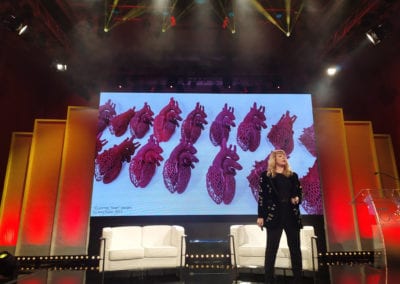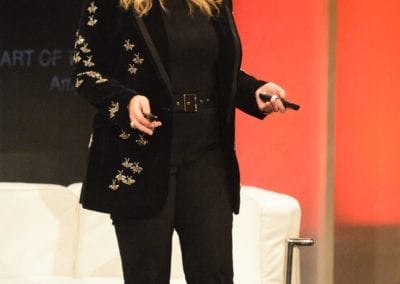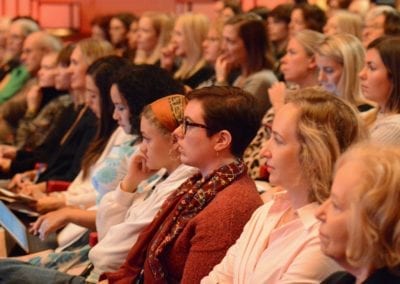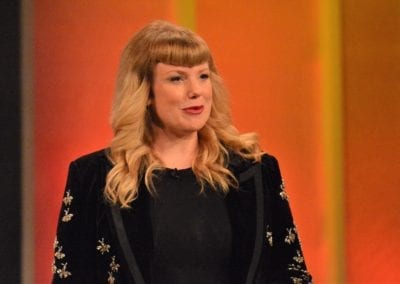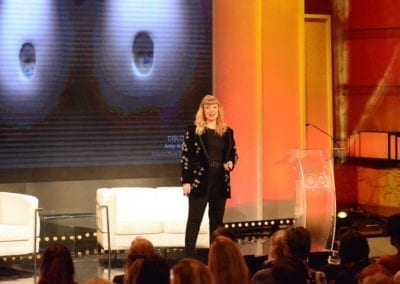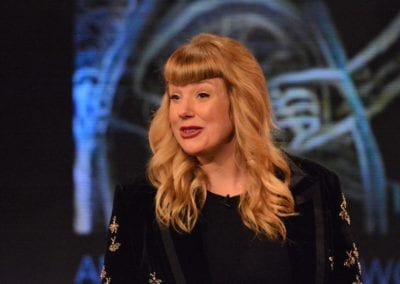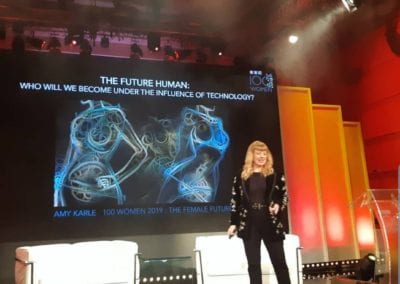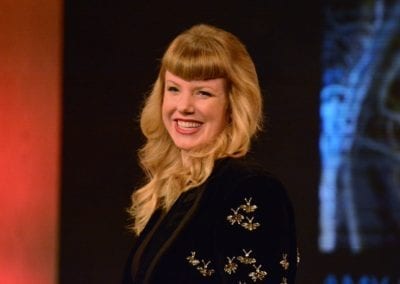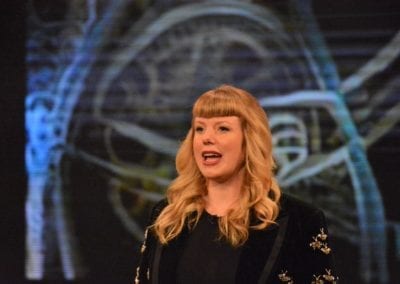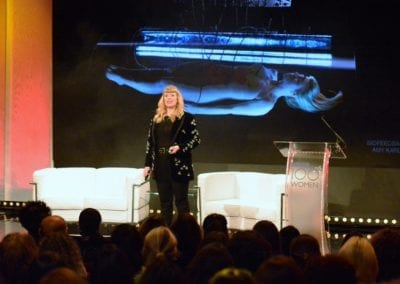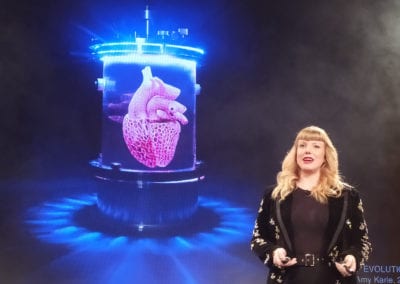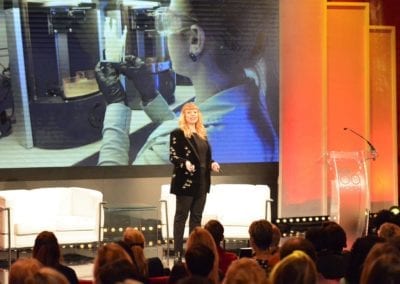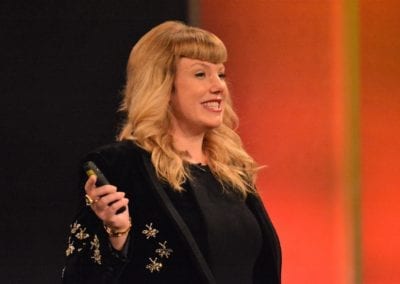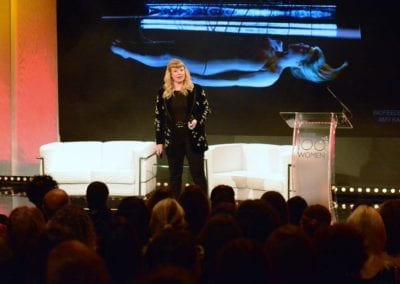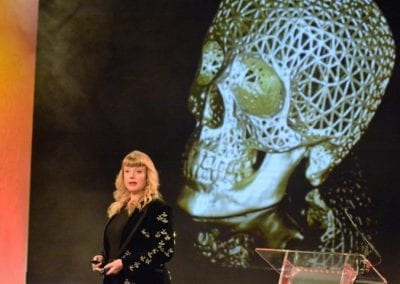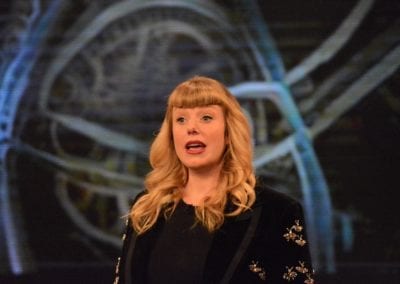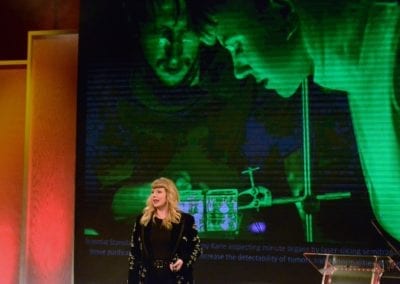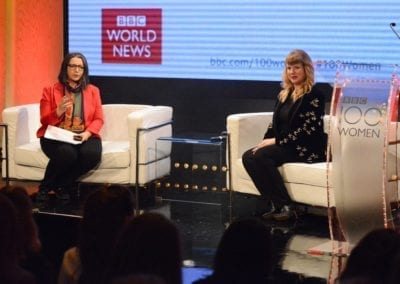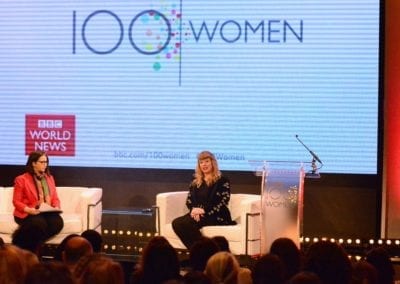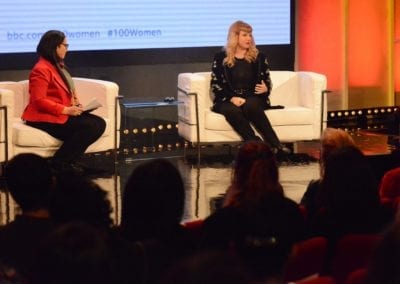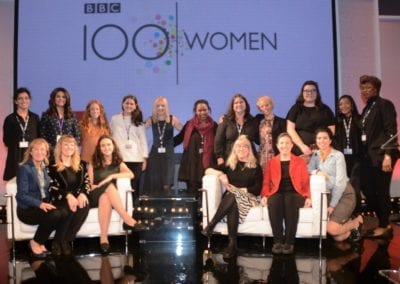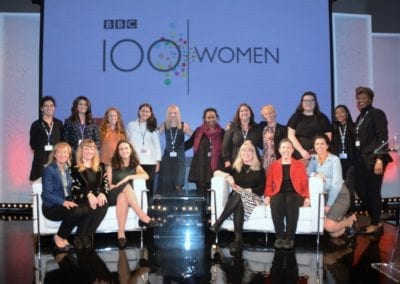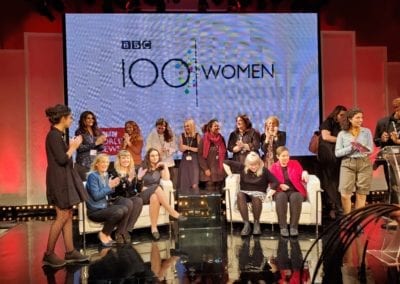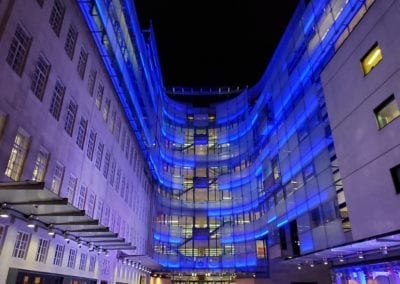BBC 100 WOMEN 2019
17 October 2019
BBC Radio Theatre
New Broadcasting House
Portland Place
London, W1A 1AA UK
BBC 100 Women names 100 influential and inspirational women around the world every year and shares their stories. This year, they selected Artist Amy Karle amongst their ranks.
Futurism – the act of predicting and shaping the future – is dominated by men. This year, BBC 100 Women is asking: What would the future look like if it were driven by women?
The BBC chose 100 of the most inspiring and influential women from around the world for 2019 who are at the top of their careers across science and the arts, politics, law, technology, sport, gender and identity, as well activists, campaigners and those who have responded to remarkable challenges in their own lives by making real change in the world around them. Full list here.
This talk by Amy Karle, “The Future Human: Who Will We Become Under the Influence of Technology?” was given at the BBC Theatre London on 17 October 2019 bbc.com/news/world-49856545
100 Women 2019 will show you versions of the future that will challenge, concern and inspire you.
The highlight of the season is two international Future Conferences including some of the 100 women. For these events we will bring together women who are experts in their fields – female futurists working at the cutting edge of science, arts, media, economics, education, fashion, religion, identity and many other areas.
From the American fertility expert who examines how the male pill will transform contraception, to the urban anthropologist exploring the design of the female-centric cities of the future and the bio-artist thinking of exponential technologies that will change our human interactions, they will predict for us what the world will look like in 2030 in their areas of expertise in inspirational, informative talks, installations and immersive VR experiences.
This program highlights inspiring content from the London Future conference, which featured a selection of the BBC’s 100 Women 2019 Honorees. The program initially aired on BBC World TV in Oct 2019 and includes segments from some of talks.
Since 2013, BBC 100 Women has been showcasing stories of inspirational women to a global audience. In previous years, a diverse group of incredible women have been honored, including make-up entrepreneur Bobbi Brown, UN Deputy Secretary General Amina Mohammed, activist Malala Yousafzai, athlete Simone Biles, supermodel Alek Wek, musician Alicia Keys, and Olympic champion boxer Nicola Adams.
Candidates were chosen from all over the world; they were selected from those who had made the headlines or influenced important stories over 2019, as well as those who have inspiring stories to tell, achieved something significant or influenced their societies in ways that wouldn’t necessarily make the news. The candidates were then assessed against this year’s theme – the Female Future – and measured for regional representation and due impartiality before the final 100 were chosen.
Photos by BBC / Bob Fallon
The BBC’s 100 most inspiring and influential women for 2019
- Precious Adams, ballet dancer, US.
- Parveena Ahanger, human rights activist, Indian-administered Kashmir.
- Piera Aiello, politician, Italy.
- Jasmin Akter, cricketer, UK-Bangladesh.
- Manal AlDowayan, artist, Saudi Arabia.
- Kimia Alizadeh, athlete, Iran.
- Alanoud Alsharekh, women’s rights activist, Kuwait.
- Marwa Al-Sabouni, architect, Syria.
- Rida Al Tubuly, peace campaigner, Libya.
- Tabata Amaral, congresswoman, Brazil.
- Yalitza Aparicio, actor and human rights activist, Mexico.
- Dayna Ash, cultural activist, Lebanon.
- Dina Asher-Smith, athlete, UK.
- MiMi Aung, project manager at NASA, US.
- Nisha Ayub, transgender activist, Malaysia.
- Judith Bakirya, farmer, Uganda.
- Ayah Bdeir, entrepreneur, Lebanon.
- Dhammananda Bhikkhuni, monk, Thailand.
- Mabel Bianco, doctor, Argentina.
- Raya Bidshahri, educator, Iran.
- Katie Bouman, scientist, US.
- Sinéad Burke, disability activist, Ireland.
- Lisa Campo-Engelstein, bioethicist, US.
- Scarlett Curtis, writer and campaigner, UK.
- Ella Daish, environmentalist, UK.
- Sharan Dhaliwal, artist and writer, UK.
- Salwa Eid Naser, athlete, Nigeria-Bahrain.
- Rana El Kaliouby, AI pioneer, Egypt.
- Maria Fernanda Espinosa, UN General Assembly, Ecuador.
- Lucinda Evans, women’s rights activist, South Africa.
- Sister Gerard Fernandez, Roman Catholic nun, Singapore.
- Bethany Firth, Paralympic swimmer, UK.
- Owl Fisher, transgender activist, Iceland.
- Shelly-Ann Fraser-Pryce, athlete, Jamaica.
- Zarifa Ghafari, mayor, Afghanistan.
- Jalila Haider, lawyer, Pakistan.
- Tayla Harris, footballer and boxer, Australia.
- Hollie, sex trafficking survivor, US.
- Huang Wensi, professional boxer, China.
- Luchita Hurtado, artist, Venezuela.
- Yumi Ishikawa, founder of anti-heels petition #kutoo, Japan.
- Asmaa James, journalist and activist, Sierra Leone.
- Aranya Johar, poet, India.
- Katrina Johnston-Zimmerman, anthropologist, US.
- Gada Kadoda, engineer, Sudan.
- Amy Karle, bioartist, US.
- Ahlam Khudr, protest leader, Sudan.
- Fiona Kolbinger, cyclist, Germany.
- Hiyori Kon, sumo wrestler, Japan.
- Aïssata Lam, microfinance expert, Mauritania.
- Soo Jung Lee, forensic psychologist, South Korea.
- Fei-Fei Li, AI pioneer, US.
- Erika Lust, filmmaker, Sweden.
- Lauren Mahon, cancer campaigner and co-host of podcast You, Me and The Big C, UK.
- Julie Makani, doctor and scientist, Tanzania.
- Lisa Mandemaker, speculative designer, Netherlands.
- Jamie Margolin, climate change activist, US.
- Francia Marquez, environmentalist, Colombia.
- Gina Martin, anti-upskirting campaigner, UK.
- Sarah Martins Da Silva, consultant gynaecologist and obstetrician, UK.
- Raja Meziane, singer, Algeria.
- Susmita Mohanty, space entrepreneur, India.
- Benedicte Mundele, fresh food entrepreneur, DR Congo.
- Subhalakshmi Nandi, gender equality expert, India.
- Trang Nguyen, conservationist, Vietnam.
- Van Thi Nguyen, CEO, Vietnam.
- Natasha Noel, yoga expert, India.
- Alexandria Ocasio-Cortez, congresswoman, US.
- Farida Osman, swimmer, Egypt.
- Ashcharya Peiris, designer, Sri Lanka.
- Danit Peleg, designer, Israel.
- Autumn Peltier, clean water advocate, Canada.
- Swietenia Puspa Lestari, diver and environmentalist, Indonesia.
- Megan Rapinoe, footballer, US.
- Onjali Rauf, writer, UK.
- Charlene Ren, clean water advocate, China.
- Maria Ressa, journalist, Philippines.
- Djamila Ribeiro, writer and equality activist, Brazil.
- Jawahir Roble, referee, UK-Somalia.
- Najat Saliba, chemistry professor, Lebanon.
- Nanjira Sambuli, digital equality expert, Kenya.
- Zehra Sayers, scientist, Turkey.
- Hayfa Sdiri, entrepreneur, Tunisia.
- Noor Shaker, computer scientist, Syria.
- Bonita Sharma, innovator, Nepal.
- Vandana Shiva, environmentalist, India.
- Pragati Singh, doctor, India.
- Lyubov Sobol, anti-corruption activist, Russia.
- Samah Subay, lawyer, Yemen.
- Kalista Sy, screenwriter and producer, Senegal.
- Bella Thorne, actor and director, US.
- Veronique Thouvenot, doctor, Chile.
- Greta Thunberg, climate change activist, Sweden.
- Paola Villarreal, computer programmer, Mexico.
- Ida Vitale, poet, Uruguay.
- Purity Wako, life coach, Uganda.
- Marilyn Waring, economist and environmentalist, New Zealand.
- Amy Webb, futurist, US.
- Sara Wesslin, journalist, Finland.
- Gina Zurlo, scholar of religion, US.
Text adapted herein adapted from information provided by BBC


